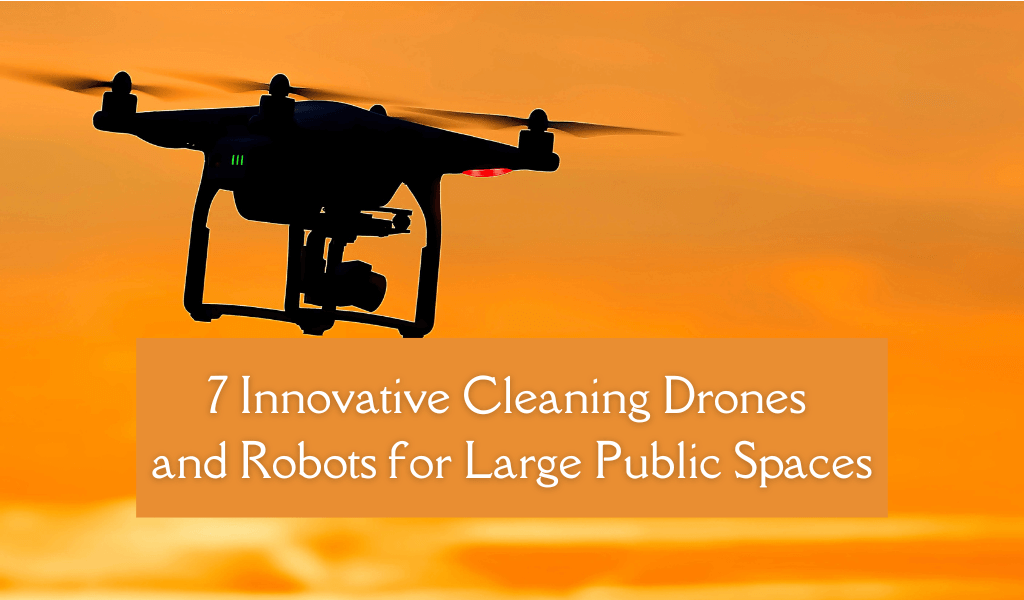Do you have large spaces on your list of commercial cleaning contracts? Then, check out some of these cleaning drones to make the job easier.
There was a time not that long ago when the idea of robots was pure science fiction. But that’s changing fast. We might not yet be at the point of robots walking hidden among us, but we do have robots and drones to help with many daily tasks. Best of all, for those in the commercial cleaning industry, there are cleaning drones!
What’s better than a drone to help us work more efficiently and get into spaces that are difficult or dangerous for humans? Perhaps you’ve even seen cleaning drones and robots in action at some major supermarkets and big box retailers.
Of course, drones won’t be suitable for every cleaning company or every situation. For example, they can’t interact with your customers the way employees can. Nor can they make decisions regarding situations that can sometimes appear mid-shift. But there is a lot they can do.
Drones can get into spaces that are too small for humans. They can reach high-rise windows that may be hazardous for humans to access. Even if you aren’t ready to use cleaning drones, it’s helpful to know what is out there.
If you are ready to take your cleaning organization to the next level, schedule a free call with Janitorial Manager to see how our software can make your janitorial operation more successful.
7 Cleaning drones and robots that could change the way you work
1. Lucid C1 Spraying Drone: Lucid Drone Technologies designed the Lucid C1 to clean exterior surfaces, including roofing and siding, while your employees remain safely on the ground. Lucid provides training and study material to pass the FAA test for flying drones, and they offer several commercial cleaning packages to help you get set up with the equipment you need to add cleaning drones to your offerings.
2. Hercules 10: The Hercules 10 is manufactured by Drone Volt, headquartered in France and with offices in the U.S., Canada, Denmark, Switzerland, the Netherlands, and Belgium. The system is designed to clean siding, roofing, solar panels, and other hard-to-reach spaces. In addition, Drone Volt offers complete flight training for all models.
3. Neo2: The Neo2, from Avidbots, is billed as a floor cleaning and disinfecting autonomous cleaning robot. This robot offers real-time obstacle avoidance and will run on a single charge for up to 6 hours, making it ideal for large spaces. The state-of-the-art software delivers an entirely autonomous cleaning without the need to monitor the device.
4. T16AMR: It may not be the catchiest name on the list, but the T16AMR, from Tennant, was one of the first robotic floor scrubbers on the scene. With a wide 36-inch cleaning path, up to 5.5 hours of run time, and easy and efficient operation, it’s easy to understand why this machine is so popular.
5. Disinfection Service Robot: From Global DWS comes the autonomous Disinfection Service Robot (DSR). Unlike cleaning drones and floor cleaning robots, this device specializes in viral disinfecting. It’s equipped with Ultraviolet-C lights and a disinfectant sprayer. And just to be sure your robot isn’t spraying your customers, the DSR has “human presence detection.” A mobile app and analytics dashboard allows you to monitor the DSR, but with autonomous navigation, this appears to be a relatively hands-off solution.
6. CLOi: From LG Business comes CLOi, an autonomous UV-C robot. CLOi was a 2021 AV Technology winner in the SmartBrief Innovation Workplace Awards. So far, test results show that the ” robot’s UVC light system show a decrease of microorganisms on common materials by 99.999 % at various distances and exposure periods.”
7. Phantas: Phantas might be the Cadillac of cleaning drones and robots. Created by Gausium, the Phantas is an “all-in-one floor cleaning solution.” The robot incorporates vacuuming, sweeping, scrubbing, and dust mopping, and can handle numerous surfaces from concrete to hardwood to low pile carpeting to bituminous road. In addition, it has all the bells and whistles you might expect from a 2022 Red Dot Award winner, including flexible path planning; real-time localization and 3D environmental perception; obstacle avoidance; and auto charging, water refill, discharge, and water tank cleaning.
Again, cleaning drones and robots might not be the right fit for every commercial cleaning company. But it’s important to know what’s out there and what the future of commercial cleaning may look like.
Harness the value of Janitorial Manager to streamline your cleaning operation like never before. Learn more today with a free discovery call and find out how to make your cleaning operation more efficient and cost effective!



Building My Own Team of Robotic Cleaners
My wife and I own a commercial janitorial business and have struggled to hire qualified employees and in recent years it has become harder. As a partial solution to my problem, I began building my own commercial cleaning robots. We now have robots that sweep floors, vacuum carpets and mop floors (the autonomous robotic auto scrubber used at our local supermarket, I was informed, costs $53,000). My current robot is a UVC sterilization robot, which if purchased on the market starts at around $45,000. We will use it to sterilize exam rooms at our medical clients. The cost to build these robots was less than $2,000. Although, the robotic sweeper and auto scrubber is just automating equipment that I already had. The robots work autonomously updating staff as to their progress and alerting them when the task is complete via a Bluetooth app. Once robots like these become affordable for small businesses, I believe you will see a real robot revolution. .
I have included a youtube link to a video of my robots at work.
https://www.youtube.com/watch?v=VQE3MTQbPXg
Curtis Lucas
Alaska Professional Janitorial, LLC.